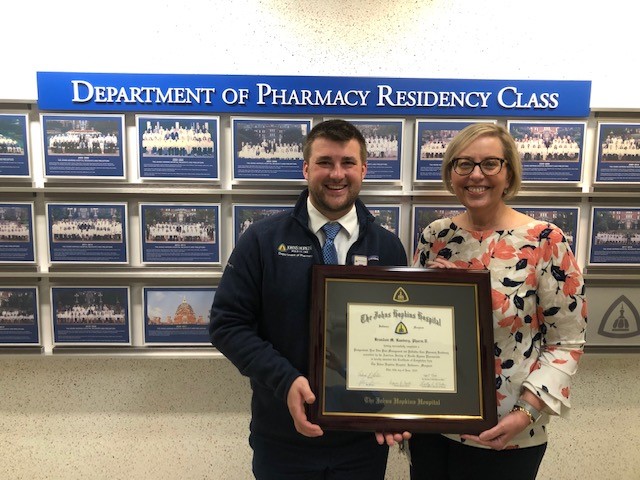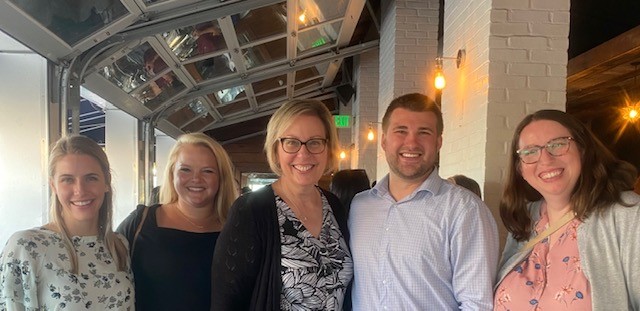Pain Management and Palliative Care Residency Program

Program Name: Pain Management and Palliative Care Pharmacy Practice
Program Type: ASHP Accredited PGY2 Specialty
ASHP Match Number: 600473
The Department of Pharmacy Services at The Johns Hopkins Hospital offers an ASHP accredited PGY2 Residency in Pain Management and Palliative Care Pharmacy Practice. This program is based upon the ASHP PGY2 Competency Areas, Goals and Objectives for PGY2 Pain Management and Palliative Care Pharmacy Residencies (2018).
Purpose
PGY2 pharmacy residency programs build on Doctor of Pharmacy (Pharm.D.) education and PGY1 pharmacy residency programs to contribute to the development of clinical pharmacists in specialized areas of practice. PGY2 residencies provide residents with opportunities to function independently as practitioners by conceptualizing and integrating accumulated experience and knowledge and incorporating both into the provision of patient care or other advanced practice settings. Residents who successfully complete an accredited PGY2 pharmacy residency are prepared for advanced patient care, academic, or other specialized positions, along with board certification, if available.
Program Overview and Objective
The PGY2 Residency in Pain and Palliative Care is a 12-month program. The program is designed to provide advanced training in clinical pharmacy practice focusing on patient care, clinical research and education in pain and palliative care. A multidisciplinary approach to inpatient and outpatient pain management and palliative care is used. Patient care experiences occur in neurosciences, palliative medicine, acute and chronic pain services, addiction medicine and hospice. Longitudinal clinic is completed in the Palliative Medicine Clinic in the cancer center. Other experiences may include psychiatric pain service, pediatric pain service, medication safety, and teaching opportunities at the Colleges of Pharmacy in the Baltimore area. Elective rotations allow the resident to explore and expand their experiences in specific areas of interests. Residents will have approximately 8-12 weeks available for elective rotations depending on individual competencies and knowledge base.
| Core Rotations (typically 1 month duration unless noted) | Elective Rotations (typically 1 month duration) |
|---|---|
|
Orientation |
Psychiatric Pain Service |
|
Neurosciences Pain Resource Team |
Medication Safety in Adult Medicine |
|
Pain and Palliative Medicine |
UMd/MedStar Palliative Care |
|
BMC Pain and Palliative Medicine |
Other elective learning experiences may be developed based on resident interest and preceptor availability |
|
Hospice (2 weeks) |
|
|
Chronic/Interventional Pain Service |
|
|
Acute Pain Service |
|
|
Addiction Medicine |
|
|
Research/Projects (December) |
|
|
Repeat 1 core rotation (pain, palliative care, or addiction medicine) |
|
|
Longitudinal Learning Experiences: (3-12 months) |
Pharmacotherapy/CE Activities: 3 months |

Staffing
Staffing commitment is 1 weekend every 2nd week for the first 3 months. If found proficient, the resident will staff every third weekend.
On Call
PGY2 residents new to The Johns Hopkins Hospital will have the same weekend on-call schedule as PGY1 residents for their first 3 months. After 3 months, the PGY-2 residents will transition to working every third weekend.
Projects
During the residency year, a self-directed research or project must be completed. The scope and type of project will vary according to individual interest. The project must be completed in a manner suitable for presentation and publication
Committees
The resident will be appointed to 1-2 committees over the course of the year. The committees will address pain and palliative care pharmacy issues and opioid stewardship. This will provide an opportunity to impact drug policy and the medication use process in a longitudinal learning experience.
Education Component
The resident is expected to participate in the instruction of pharmacy staff, fellow residents, pharmacy students, medical staff, and nursing. This will occur both on a formal and informal basis. Residents are required to give an ACPE-accredited Pharmacotherapy Rounds presentation. The resident will be expected to participate regularly in weekly pain management or palliative care rounds and topic discussions.
Pain and Palliative Care Topic Discussion
The resident will participate in a pharmacy based pain and palliative care topic discussion 1-2 times per month. Residents and preceptors will lead the discussion. Additional topic discussions will occur informally throughout the residency year with the goal of satisfying all content areas within the ASHP PGY2 Competency Areas, Goals and Objectives for PGY2 Pain Management and Palliative Care Pharmacy Residencies Appendix.
Pharmacotherapy Rounds
The resident will provide at least 1 major ACPE accredited presentations. This will include the required Pharmacotherapy Rounds and optional Department of Pharmacy Continuing Education.
Requirements for Successful Completion of the Johns Hopkins Hospital PGY2 Pain Management & Palliative Care Pharmacy Residency Program
- Residents shall be licensed as a pharmacist in the state of Maryland as described in the JHH Pharmacy Residency Manual.
- Residents shall provide one ACPE-accredited Pharmacotherapy Rounds activity and assess evaluations submitted.
- Residents shall successfully complete a residency project. Successful completion will be indicated by:
- a formal oral presentation at a local, regional, or national conference
- a final evaluation by the residency project advisor
- a written manuscript that meets guidelines for submission to a journal
- a cover memo with the project advisor’s signature indicating approval of the project and the manuscript are due to the Program Director by June 15th
- Resident must obtain ‘achieved for residency’ for at least 80% of all program objectives. In addition, resident must obtain ‘achieved for residency’ for all fundamental objectives in R 1.1
- Residents must complete the following deliverables required by the program’s Competency Areas, Goals and Objectives (CAGOs):
- Write 10 Pain and/or Palliative Medicine consult notes in the electronic medical record documenting direct patient care activities
- Prepare or revise one drug class review, monograph, treatment guideline, or protocol
- Write one local, regional, or national communication related to pain management and palliative care (i.e., article, clinical pearl, etc.)
- Residents must complete 100% of the Appendix
All program requirements must be completed by 5 PM EST on the last day of the residency year. In the event the resident does not complete all requirements by this deadline, the resident will not have successfully completed the residency program and will not be awarded a certificate. There is no option to fulfill residency requirements beyond this deadline, unless the resident has taken an approved leave of absence, has a written plan, approved by the Chief Pharmacy Officer, RPD and resident, including the planned date of return to residency and due dates for submission of outstanding residency requirements.
Confirmation of the successful completion of the program requirements is with the responsibility of the Residency Program Director. The Residency Program Director may require confirmation and/or approval from the assigned Facilitator and/or Residency Project Advisor to confirm successful completion of the residency program requirements. Residents who have not successfully completed all of the requirements are not eligible to receive a certificate of completion or attend the end-of-year function when Certificates of Residency Training are awarded. A Certificate of Residency Training can be awarded when all of the requirements have been completed.
Requirements for Acceptance to the Program
A candidate for the PGY2 Pain and Palliative Care Residency at The Johns Hopkins Hospital must have completed a PGY1 Pharmacy Practice Residency or have equivalent experience. He/she needs to be a licensed pharmacist and eligible for licensure in the state of Maryland.
Preceptors
Please refer to the “Preceptors” section of the Department of Pharmacy, Johns Hopkins Medicine website.
Website: http://www.hopkinsmedicine.org/pharmacy/residents//
Program Director: Suzanne Amato Nesbit, PharmD, FCCP, BCPS, CPE
Titles: Clinical Pharmacy Specialist, Pain Management and Palliative Care
Research Associate, Department of Oncology
Center for Drug Safety and Effectiveness, Bloomberg School of Public Health
Education: B. S. Pharmacy, Ohio Northern University
Doctor of Pharmacy, The Ohio State University
Certification: Board Certified Pharmacotherapy Specialist
Practice Areas: Oncology Pain and Palliative Care, Neurosciences, Opioid Stewardship
Research Interest: Novel opioid delivery systems, opioid availability internationally, pain education
Dr. Nesbit is currently on the Palliative Medicine Service and the Neuroscience Pain Resource Team at The Johns Hopkins Hospital. She is a Clinical Specialist in Pain Management and Palliative Care with the Department of Pharmacy. Dr. Nesbit holds faculty appointments in the Department of Oncology and the Center for Drug Safety and Effectiveness in the Bloomberg School of Public Health at Johns Hopkins, as well as, the Schools of Pharmacy at University of Maryland and Notre Dame University of Maryland. She has been practicing in pain management for over 30 years. Dr. Nesbit has served as Chair of the Pain Management Subcommittee of the Maryland Cancer Plan, Chair of the Pain & Palliative Care PRN of ACCP (American College of Clinical Pharmacy), Chair of the ASHP (American Society of Health-System Pharmacists) Pain and Palliative Care Section Advisory Group, and was appointed to The Joint Commission Technical Advisory Panel for Pain Management in 2016. She served on the Board of Regents for the American College of Clinical Pharmacy (ACCP) from 2012-2015 and elected a Fellow in 2016. She also served a term as ACCP President (2017-2020). Dr Nesbit is Co-Chair of the Johns Hopkins Hospital Pain Management Committee and The Johns Hopkins Health System Opioid Stewardship Clinical Community. She became a Fellow of ASHP in 2022 and is serving on the Commission on Credentialing (2022-2025).
Contact
Suzanne Amato Nesbit, Pharm.D, BCPS, FCCP, FASHPClinical Pharmacy Specialist, Pain Management and Palliative Care
The Johns Hopkins Hospital/Department of Pharmacy
600 N. Wolfe Street / Carnegie 180
Baltimore, MD 21287-6180
Phone 410-502-3578
Email: [email protected]
